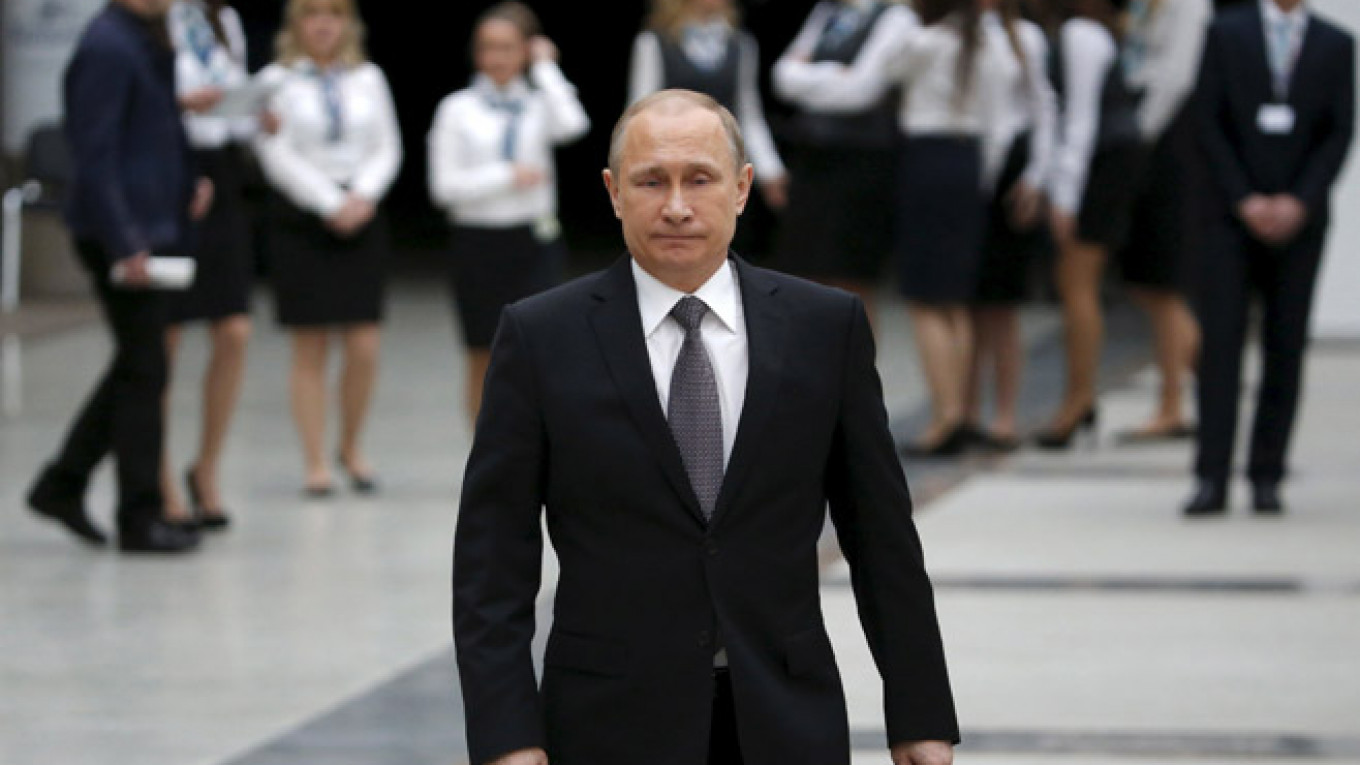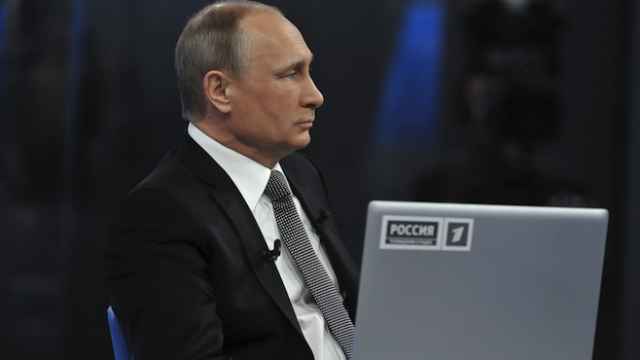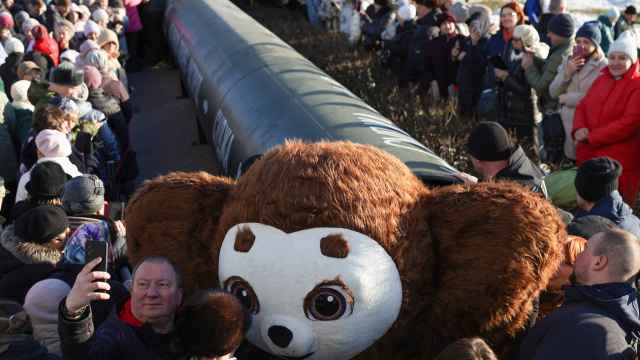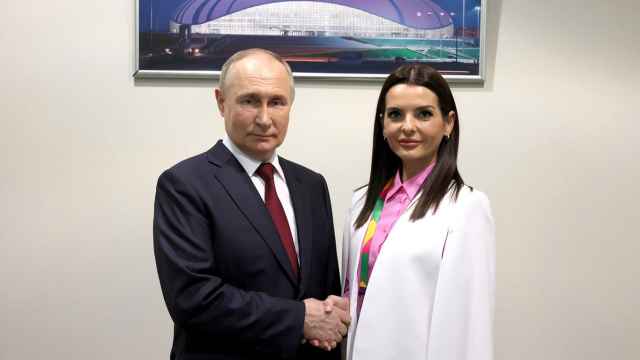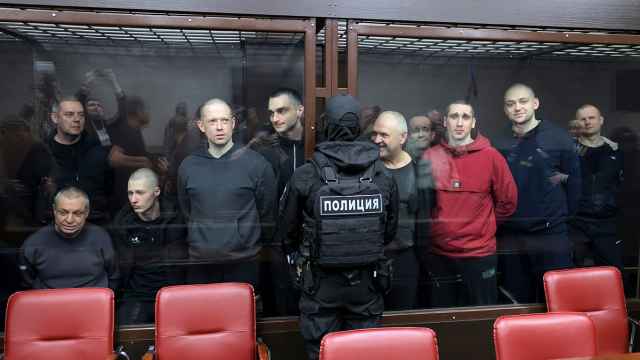The state of the Russian economy and the lives of ordinary people took precedence over foreign policy and the Ukraine crisis during President Vladimir Putin's annual call-in show Thursday, signaling a shift in the country's agenda.
Unlike the previous call-in show one year ago, which took place hot on the heels of Russia's annexation of the Crimean Peninsula, and Putin's last two annual news conferences in which Ukraine was the dominant theme, Thursday's four-hour show was nearly halfway through before a question about Ukraine was asked. Questions from Crimea were left for the last part of the show.
The state television channels that broadcast the show periodically cut to different locations across the country to show people asking questions from their native regions. Others were selected from the studio audience in Moscow.
The overall tone was Putin's trademark stance of suggesting that he personifies the will of the Russian people, whom he understands wholeheartedly.
"If we want people to trust us, then we also have to have a heart and understand how ordinary people live," the president said.
Putin fielded 74 questions from more than three million that the organizers said they received via phone, SMS and online.
Some of the key messages presented by Putin during the show were that Russia has weathered the worst stage of its economic crisis, Stalinism was ugly but cannot be compared to Nazism, there will be no war over Ukraine and there are no Russian troops there.
Contrary to earlier statements made by high-ranking government officials, Putin said that the West was not responsible for tearing Ukraine away from Russia.
"We did that ourselves when we made the decision on Russia's sovereignty at the beginning of the 1990s. What step did we take? We freed them from us," Putin said.
Russia's Role Abroad
Putin repeatedly said while speaking about foreign policy issues that the United States plays a negative role in major world conflicts, including in the Middle East. He also drew on the U.S. for comparison when answering questions about Russia.
The U.S. is still making the mistake made earlier by the Soviet Union by imposing its own ideology around the world, Putin said in answer to a question about comparisons between the Soviet Union and Nazi Germany.
Explaining Russia's decision to supply S-300 surface-to-air missiles to Iran, Putin said that the U.S. still sends far more weapons to the Middle East.
The president said Russia is prepared to send the missiles to Iran — a decision opposed by Israel and the U.S. — because a preliminary agreement on its nuclear program is on track to being signed.
In the same vein, Putin slammed the U.S. for causing the emergence of the Islamic State terrorist group by invading Iraq and deposing its leader Saddam Hussein.
"Certain big countries, superpowers that claim to be exceptional and think of themselves as the only center of power in the world, don't need allies — they need vassals. I mean the U.S.," he added, in case there was any doubt.
"Russia cannot exist in such a system of relationships," Putin said.
The president said that Russia is being contained and pressured due to its unbending desire to pursue an independent foreign policy, and that the only way Russia's relationship with the West can be normalized is if Moscow's stance is respected.
Domestic Policy
Foreign policy questions were mostly secondary to specific questions about people's personal hardships, such as declining real incomes, delays in salaries being paid, erratic pension system reforms and prohibitive interest rates for small businesses.
Responding to these issues, Putin adopted his trademark method of reeling off a long list of specific measures without announcing any drastic reforms. This prompted gentle criticism from former Finance Minister Alexei Kudrin, who called for fundamental structural reforms, pointing out that Russia will lag behind most developed Western states at its current rate of development.
In response, Putin essentially told Kudrin that he cannot implement drastic reforms in the social sphere — for instance by increasing the retirement age — because ordinary people would suffer and that would be politically damaging to him.
At the same time, the president said he was ready for more competition from the political opposition, saying that it was both possible and desirable for members of the opposition to get into the State Duma, the lower house of Russia's parliament.
Putin called the February murder of prominent opposition leader Boris Nemtsov "shameful and tragic" and praised the work of investigators, who he said had identified the killers "within hours." The president said he did not know who, if anyone, had ordered the murder.
Putin's Dream
The annual call-in show has often been criticized as a manifestation of the deficiencies of Russia's system of governance, in which it takes the president to solve issues that could easily be addressed at a local level.
In one such incident, Sofia Babich, a 15-year-old girl from Tolyatti who suffers from cerebral palsy, asked Putin for an exercise machine that, with a price tag of 20,000 rubles ($400), she cannot afford.
"I really want to walk. Love you. Your Sonya. Bye," she said in a video message. Putin said he would solve the problem.
Speaking about the rationale behind such shows, Putin said that it was a powerful tool for him to find out what is really happening in the country and also share his own vision on major issues with the Russian people.
"I see a prosperous Russia and citizens who are happy and confident in their future," Putin told the audience at the end of the show in response to a question about his vision for Russia.
Contact the author at i.nechepurenko@imedia.ru
A Message from The Moscow Times:
Dear readers,
We are facing unprecedented challenges. Russia's Prosecutor General's Office has designated The Moscow Times as an "undesirable" organization, criminalizing our work and putting our staff at risk of prosecution. This follows our earlier unjust labeling as a "foreign agent."
These actions are direct attempts to silence independent journalism in Russia. The authorities claim our work "discredits the decisions of the Russian leadership." We see things differently: we strive to provide accurate, unbiased reporting on Russia.
We, the journalists of The Moscow Times, refuse to be silenced. But to continue our work, we need your help.
Your support, no matter how small, makes a world of difference. If you can, please support us monthly starting from just $2. It's quick to set up, and every contribution makes a significant impact.
By supporting The Moscow Times, you're defending open, independent journalism in the face of repression. Thank you for standing with us.
Remind me later.


